BIOLOGY AT FETTES AT FETTES AT FETTES ... - Fettes College
BIOLOGY AT FETTES AT FETTES AT FETTES ... - Fettes College
BIOLOGY AT FETTES AT FETTES AT FETTES ... - Fettes College
Create successful ePaper yourself
Turn your PDF publications into a flip-book with our unique Google optimized e-Paper software.
<strong>BIOLOGY</strong> <strong>BIOLOGY</strong> <strong>AT</strong> <strong>FETTES</strong><br />
RESULTS ESULTS 2012<br />
• IGCSE - 100% A*/A<br />
• A Level – 57% A*/A/B<br />
• IB Higher Level – average 6.00 (worldwide average 4.39)<br />
• IB Standard Level – average 5.85 (worldwide average 4.29)<br />
THIRD THIRD THIRD FORM<br />
FORM<br />
This course is a 'taster' of GCSE and several topics of the IGCSE syllabus are studied<br />
here. Pupils start the course with basic cytology and are taught how to use a microscope<br />
in the first few weeks of term. From here they study taxonomy and look at the variety of<br />
life. Dissections of fish, examinations of preserved specimens and the large variety of<br />
animals kept in the department are used for illustration as well as a large number of<br />
videos and visits to the botanic gardens, which are a short stroll away. The spring term<br />
is spent examining reproduction in both plants and animals and pupils are shown how<br />
to design, carry out and write up their own practical work. The summer term is spent<br />
in the grounds of <strong>Fettes</strong> studying ecology. This culminates in the third form field week<br />
situated in the Cairngorms.<br />
IGCSE IGCSE B<strong>BIOLOGY</strong><br />
B IOLOGY<br />
All Pupils take all three IGCSE Sciences with the opportunity to either gain GCSE’s in<br />
all three sciences or take Double Award Science where pupils study the three sciences<br />
with specialist teachers but take a shortened examination which gives them two GCSE’s.<br />
Pupils are set by ability and there are regular assessments to ensure they are in the set<br />
best suited to their strengths and weaknesses.<br />
IGCSE Biology follows the edexcel syllabus and includes topics such as physiology,<br />
botany, biotechnology, inheritance and ecology. Practical work is integrated into the<br />
course and students develop their manipulative and analytical skills whilst carrying out a<br />
wide range of investigations. After two years the students sit theory papers which assess<br />
their biological knowledge and practical skills. From here, pupils wishing to pursue a<br />
career involving science can follow one of two pathways: A Levels or the International<br />
Baccalaureate.
A A LEVEL<br />
LEVEL<br />
AS and A Level Biology follows the OCR syllabus. Three modules are required for an<br />
AS and six for an A2 Level qualification and all courses are taught with a high level of<br />
practical work incorporated into the schemes of work.<br />
AS Biology H0201 consists of three modules:<br />
1. Cells, Exchange & Transport - cytology, breathing & transport in plants.<br />
2. Molecules, Biodiversity, Food & Health - biochemistry, food & production, health<br />
& disease, biodiversity & Evolution & classification.<br />
3. Practical Skills in Biology - this consists of three practical assessments by can be<br />
taken up to three times each and the best mark carried forward.<br />
A2 Biology consists of the following Units:<br />
1. Communication, Homeostasis and Energy. This consists<br />
of respiration, photosynthesis, populations, nervous system and homeostasis.<br />
2. Control, Genomes and Environment. This consists of theoretical genetic crosses,<br />
genetic engineering, human genetics, biotechnology and ecology.<br />
3. Practical Skills in Biology 2. This consists of internally assessed practical<br />
coursework.<br />
IB Biology can be taken at both Standard and Higher Level. Higher level candidates<br />
complete a compulsory 60 hours of practical work as part of their coursework and<br />
Standard level 40 hours.<br />
The syllabus is very extensive and option topics include Neurobiology and behavior,<br />
Evolution and Exercise and Disease.<br />
IB<br />
FIELD FIELD WORK<br />
WORK<br />
As well as the ecological field work carried out in the grounds of <strong>Fettes</strong>, all Third Form<br />
pupils attend a 'field week' in Abernethy at the end of the summer term. Both the<br />
Biology and Geography Department carry out field work during this week. Here pupils<br />
have the opportunity to study aquatic ecosystems and observe both current and former<br />
native wildlife at the Highland Wildlife Park. It is not all hard work and pupils have the<br />
option of practicing their outdoor skills in rock climbing, canoeing and other exciting<br />
activities. At the end of the week, pupils write a report on a topic studies during the<br />
field week for which there is a substantial prize for the top three.<br />
All A Level and IB Biologists get a chance to attend a Marine Biology field course at the<br />
end of the Lower Sixth. This is held at the University Marine Biology Station, Millport,
Isle of Cumbrae. The pupils study benthic ecosystems by trawling on the university<br />
research vessel as well as studying both rocky and sandy shores. Formal lectures take<br />
place in the morning, followed by field and practical work in the afternoon often with a<br />
round-up session in the evening.<br />
EXTRA EXTRA-CURRICULAR<br />
EXTRA CURRICULAR<br />
Edinburgh is a city with extensive resources in life sciences and the biology department<br />
run weekly outing which include visits to the following:<br />
• Edinburgh University Electron Microscopy Unit<br />
• The MRC Human Genetics Research Laboratories<br />
• Edinburgh Zoological Gardens<br />
• The Royal Botanical Gardens<br />
• Visits to the Royal <strong>College</strong> of Surgeons, Royal <strong>College</strong> of Physicians<br />
ANIMAL ANIMAL CLUB<br />
CLUB<br />
The Animal Club offers students the opportunity to study Animal Husbandry which<br />
can contribute to part of their Duke of Edinburgh Award. The Department has an<br />
extensive Animal Room which houses rabbits, guinea pigs, hamsters, rats, terrapins,<br />
two ferrets (Gerald and Jemima) and, occasionally, a visiting constrictor. In addition,<br />
we also have a variety of invertebrates including Madagascan hissing cockroaches, giant<br />
Congo millipedes, fruit beetles, Giant African Land snail and stick insects. Pupils learn<br />
basic care practices and have the opportunity to visit Edinburgh Zoo and local Vets.
AN<strong>AT</strong>OMY AN<strong>AT</strong>OMY CLUB<br />
CLUB<br />
Not for the faint-hearted, Anatomy Club gives Sixth Form pupils an opportunity to<br />
develop skills in dissection and biological illustration. Not only is this useful to those<br />
who are considering a career in Medicine or Veterinary Science but it also allows pupils<br />
with an interest in Biology to explore the subject further. Last year some of the students<br />
had the opportunity to practice their sewing and competed in a Surgical Skills<br />
Competition held by the Royal <strong>College</strong> of Surgeons.<br />
MEDICS/VETS MEDICS/VETS & & & OXBRIDGE OXBRIDGE GROUP GROUP<br />
GROUP<br />
A large percentage of pupils studying Biology in the sixth form aim for medicine,<br />
veterinary medicine or Oxbridge biological/natural sciences. To give these pupils<br />
experience for the specialist examinations such as the Bmat and the testing interviews<br />
we offer extra classes which consist of weekly meetings and specialist outside visits.<br />
Pupils are encouraged to expand their work experience in a variety of ways and to<br />
develop the skills required to impress admission tutors. Regular group discussions are<br />
encouraged as well as independent and higher level thinking skills.<br />
SCIENCE SCIENCE SOCIETY SOCIETY<br />
SOCIETY<br />
All Sixth Form Biologists are encouraged to attend the Science Society. The Society<br />
organises speakers from Universities around the country and offers pupils a forum for<br />
discussion. It also runs a regular news board, science book club and visits to local sites<br />
of scientific interest.<br />
Regular events include:<br />
• Visits to the Royal <strong>College</strong> of Surgeons, Royal <strong>College</strong> of Physicians and<br />
the Royal Society of Edinburgh<br />
• Science Society treasure Hunt and BBQ<br />
• Science & Society Quiz Night - based on a local pub quiz<br />
• Book club - discussion of popular science literature<br />
• Talks by distinguished visiting lectures from universities throughout the<br />
country.
<strong>BIOLOGY</strong> <strong>BIOLOGY</strong> STAFF<br />
STAFF<br />
We have four full time teaching staff and two technicians.<br />
Dr. Dr. Dr. S.A. S.A. S.A. Lewis Lewis Lewis - Head Head of of Department<br />
Department<br />
BSc Hons. University of London, PhD Zoology University of Glasgow<br />
Doctoral thesis on heavy metal pollution in the marine environment and using seabirds<br />
as monitors of heavy metals. This included extensive fieldwork on Foula, St. Kilda and<br />
in the North Sea.<br />
Main interests in school include horse riding, Science Society & Animal Club. Interests<br />
outside school include one-day eventing, Munro bagging, theatre, reading and sailing.<br />
Mr Mr Mr H A S M Exham Exham<br />
BSc Hons. University of Bristol, PGCE, King’s <strong>College</strong> London<br />
Main interests in school include Football and working in Craigleith as Assistant<br />
Housemaster. Interests outside school include reading, technology, traveling and<br />
spending time with his wife and daughter.<br />
Mr Mr H H McCowan McCowan Hill<br />
Hill<br />
BSc Hons. University of Liverpool, PGCE, University of Manchester.<br />
Main interests include rubgy, swimming & football. Outside school interests include<br />
travel and diving.<br />
Mr Mr D. D. Dowey<br />
Dowey<br />
BSc. Hons University of Glasgow<br />
Main interests in school include rugby, hockey, athletics and clay pigeon shooting.<br />
Interests outside school include cycling, travelling and spending time with his family.<br />
Mrs Mrs Jean Jean Hutchinson<br />
Hutchinson<br />
Jean recently went part time after 13 years as chief technician but still keeps the<br />
department running smoothly and maintains the animal room. Outside school her<br />
grandchildren keep her busy.<br />
Mr Mr Alan Alan Lennon<br />
Lennon<br />
Alan joined us in 2011 and is the full time technician. Alan came to us after working at<br />
the MRC and he is still keen to keep up to date with all things scientific.


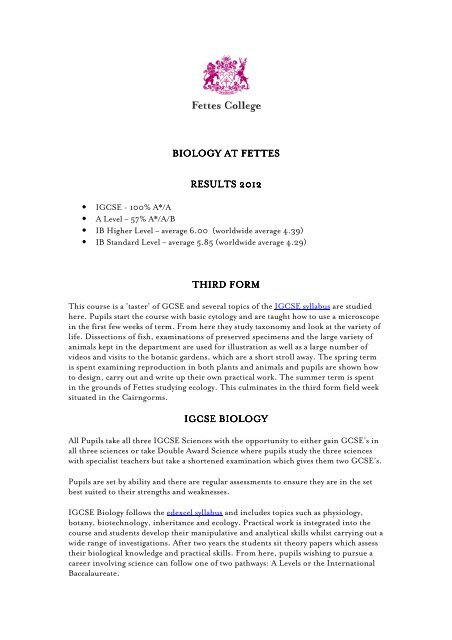
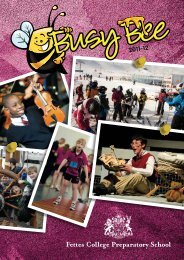
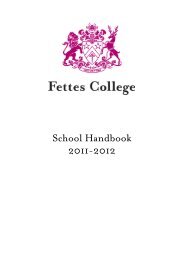
![Is it Possible to Write a History of Disgust? [PDF - 182kB]](https://img.yumpu.com/20800178/1/184x260/is-it-possible-to-write-a-history-of-disgust-pdf-182kb.jpg?quality=85)
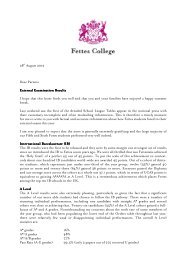
![Hockey end of season report [PDF - 209kB] - Fettes College](https://img.yumpu.com/20800168/1/184x260/hockey-end-of-season-report-pdf-209kb-fettes-college.jpg?quality=85)
![Freddie G Gadda Prize Entry [PDF - 46kB]](https://img.yumpu.com/20800166/1/184x260/freddie-g-gadda-prize-entry-pdf-46kb.jpg?quality=85)
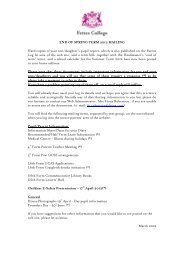
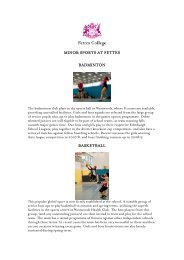
![Headmaster's Speech 2013 [PDF - 77kB] - Fettes College](https://img.yumpu.com/20800154/1/184x260/headmasters-speech-2013-pdf-77kb-fettes-college.jpg?quality=85)
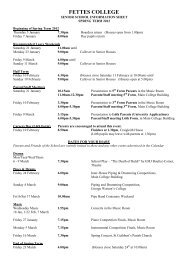
![Moredun Short Story Entry [PDF - 20kB]](https://img.yumpu.com/20800147/1/184x260/moredun-short-story-entry-pdf-20kb.jpg?quality=85)
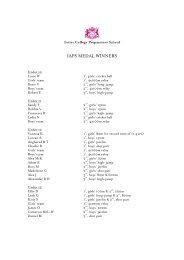
![Fettes News: Issue 1 October 2008 [411709kb] - Fettes College](https://img.yumpu.com/20800142/1/184x260/fettes-news-issue-1-october-2008-411709kb-fettes-college.jpg?quality=85)
![Fettes News: Issue 3 May 2009 [1134144kb] - Fettes College](https://img.yumpu.com/20800143/1/184x260/fettes-news-issue-3-may-2009-1134144kb-fettes-college.jpg?quality=85)